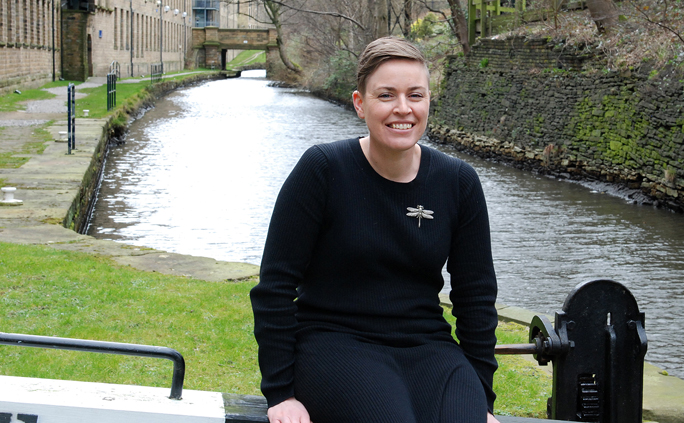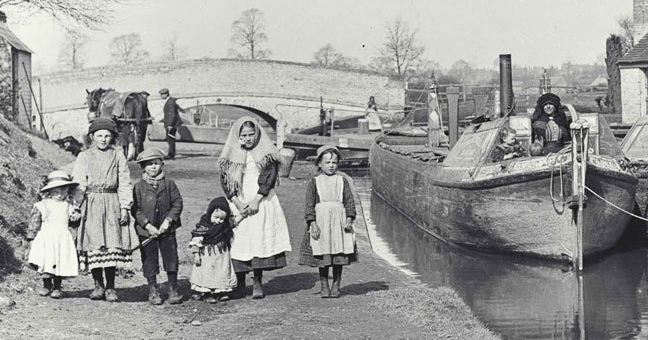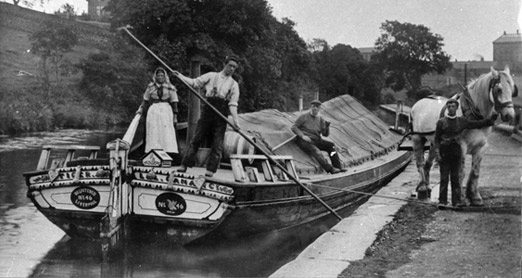Researching the people who lived and worked on Britain’s canals

Thu, 24 Mar 2016 14:51:00 GMT
 Dr Jodie Matthews looks at the lives of the Victorian communities of Britain’s waterways in her role as the first honorary research fellow for the Canal and River Trust
Dr Jodie Matthews looks at the lives of the Victorian communities of Britain’s waterways in her role as the first honorary research fellow for the Canal and River Trust
TODAY’S canal travellers are mostly leisure boaters, in pursuit of tranquillity. Their Victorian predecessors were families who lived and worked afloat, earning mistrust and criticism from respectable society. This means they are a natural subject for the University of Huddersfield’s Dr Jodie Matthews, who specialises in nineteenth-century attitudes towards people who travelled Britain, including Romanies and Gypsies.
She has already authored articles on bargee families and now she has been appointed by the Canal and River Trust as its first honorary research fellow.
Dr Matthews – who gives a free public lecture – Reading the Waterways – at the University of Huddersfield on April 20 – has started to establish a new Canal Research Network, bringing academics, heritage professionals and enthusiasts together to talk about new approaches to exploring waterways history and research. She is also helping with new designs for the Gloucester Waterways Museum.
“I have been led into this area of research because the comparison is made frequently in nineteenth-century texts between canal boat people and Romanies, and for a lot of the same reasons – fear of people who travel and the fact that they seem to be a community apart,” said Dr Matthews.
The fact that the University of Huddersfield’s campus is bisected by the picturesque Huddersfield Narrow Canal also played a part in the expansion of Dr Matthews’s research. Her first office overlooked the waterway and it helped to stimulate her interest in the lives of families who lived on canal boats, and also the wider waterway community, such as lock keepers and navvies.
Although inland waterways retained a commercial role for a considerable time, the coming of the railways meant they faced severe competition and one result was that – to cut living costs – bargees and their families lived permanently on their boats and subsequently gained a reputation for drunkenness, violence and lack of religious observance.
Dr Matthews has already explored the representation of canal people and the attitudes towards them and other travelling communities in two articles for the journal Nineteenth-Century Contexts. The first – from 2013 – is entitled “Thousands of these floating hovels”: Picturing Bargees in Image and Text. This has now been followed by Mobilising the Imperial Uncanny: Nineteenth-Century Textual Attitudes to Travelling Romani People, Canal-Boat People, Showpeopleand Hop-Pickers in Britain.
 Representations of canal boat people
Representations of canal boat people
Victorian attitudes to bargee families were complex and varied, according to Dr Matthews,
“It was very similar again to the way the Romani were represented,” she said. “On the one hand there was exoticism, because canal life seemed a counter to urbanisation. In a strange way, given their role in industrialisation, the canals seemed to offer a quiet life that was different to the frenetic pace of modernising Britain.
“But then a lot of the representations come from a religious perspective, because canal people were often seen as alcoholic, illiterate Sabbath breakers whose children were mistreated. All of these were exaggerations, although they did have to work on the Sabbath to make it pay.”
The Canal and River Trust was keen to appoint Dr Matthews because, as a literature scholar she provides a different perspective on canal history. In addition to promoting academic research, she also intends to engage with the public and to incorporate the discoveries that are being made by canal enthusiasts and family historians.
The Trust’s Head of Museums Graham Boxer, said: “The national waterways museum collection and archives tell the stories of the people who lived and worked on our waterways – from celebrated engineers to anonymous bargees and navvies – who changed the face of Britain. These people literally made history and we want to work with more researchers, academics and universities to make these stories more accessible to a wider audience. We are delighted to have Jodie Matthews on board as our first honorary research fellow.”
- On Wednesday 20 April, Dr Matthews gives a free public lecture entitled Reading the Waterways: the Nineteenth Century and Today. It takes place in the University of Huddersfield’s West Building at 6:30pm.
- During 2016 Canal and River Trust is celebrating the 300th anniversary of the birth of pioneering canal engineer James Brindley and also the 40th anniversary of the canal museum at Ellesmere Port – first set up entirely by volunteers. The museum will be celebrating both events during the year. For more information, visit the website.







